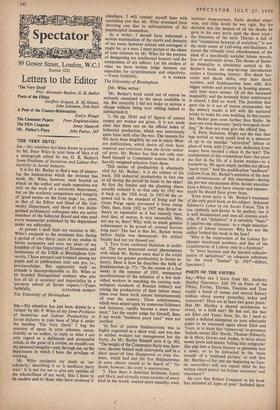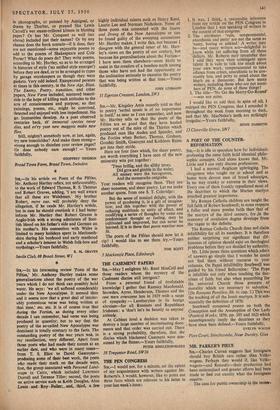POETS OF THE FIFTIES SIR,—What can I learn from Mr.
Anthony Hartley (Spectator. July 20) on Poets of the Fifties, Forties, Thirties, Twenties and Tens except a batch of names and several history notions about poetry yesterday, today and tomorrow? 'Here are at least two great poets.' Has Mr. Hartley a shrewd percipience to reveal, or a bold one? He has not; his two are Eliot and Yeats. Now, Sir, do I need to spend a deflated ninepence on your admirable paper to be reassured again about Eliot and Yeats, or to learn that 'runners-up' to greatness 'include, names like' Hardy, Thomas (Edward), de la Mare, Graves and Auden, to learn about newer poets and poems 'falling into categories' like pigs into a bacon factory or gloxinias into a sewer, or to be instructed in the 'main strands' of a 'confused picture,' or told that Mr. Hartley—I for one am beginning no fran- tic researches—will not repeat what he has written about poetry 'on former occasions' and 'elsewhere'?
He says that Robert Conquest in his book 'has included all types of poet.' Included them
in photographs, or painted by Annigoni, or drawn by Thurber, or pressed like Lewis Carroll s wet steam-rollered kittens in blotting paper? Or has 'Mr. Conquest as well (see above) included just their names? Or by any chance does the book contain—if it does, they are not mentioned—some enjoyable poems to add to the poems of Shakespeare and Cole Porter? What do poets do? They write poems. according to Mr. Hartley, so as to be arranged in histories of style ('no unified style emerges') before they are dead, or to be arranged in types by garage storekeepers as though they were gaskets. Very odd indeed. Exasperated persons at times in this century, in the New Age, Blast, The Enemy, Poetry, transition, and other papers, New Verse included, scattered insecti- cide in the hope of killing such attitudes to the arts of consciousness and purpose, so that paintings, poems, etc., might be contrived, detected and enjoyed with less impediment. No go. Immunities develop. As a poet observed centuries back, th' immortal species never dies, and ev'ry year new maggots make new flies.
Still, mightn't somebody now, at last, again, try new insecticides? And make them strong— strong enough to disinfest your review pages? Or does nobody care enough? — Yours faithfully,
GEOFFREY GRIGSON
Broad Town Farm, Broad Town, Swindon



































 Previous page
Previous page